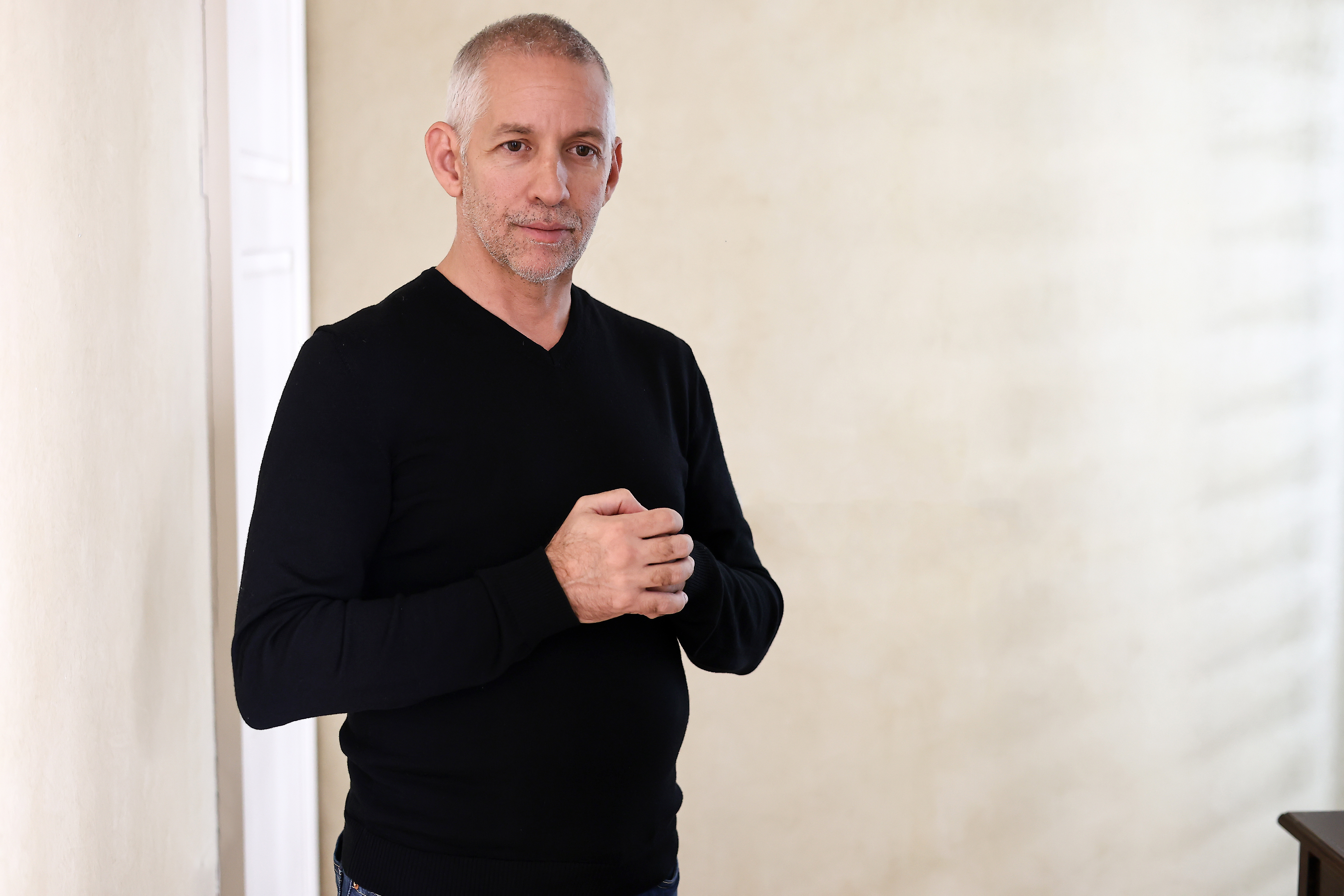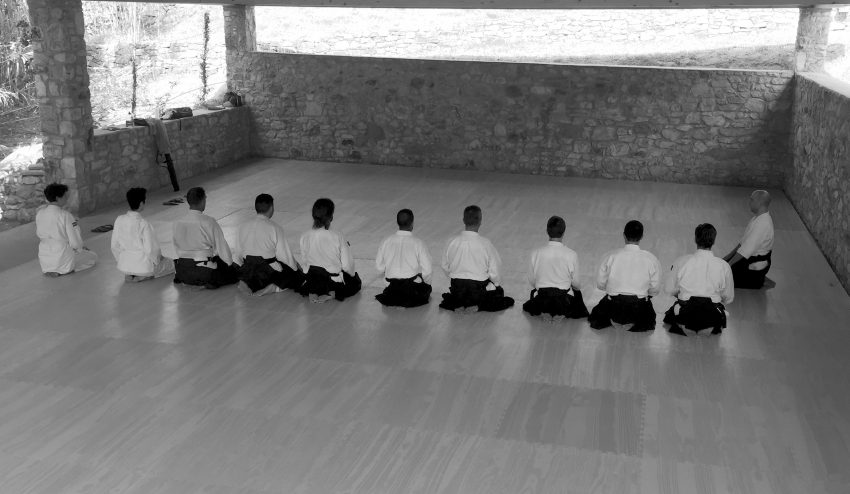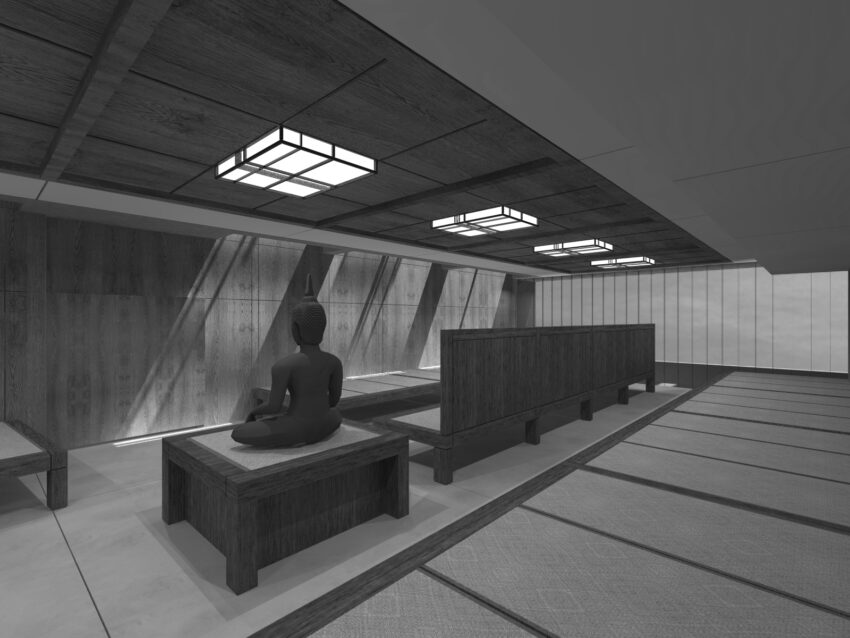First Zen monastery in Greece in the works
The accommodation for the monks on Serifos and the temple in Athens’ Kerameikos neighborhood will both be ready in the coming months

Konstantinos Sgoumpopoulos, a Zen abbot as well as shipping and real estate businessman, talks to Kathimerini about the first Zen monastery to be built in Greece and the wider region.
“We are building the infrastructure that can house and teach Zen for the future. And we want this infrastructure to be maintained, to be kept complete and autonomous, so that it can pass on the teachings in perpetuity, like in Japan, where our roots, our Bodhi tree, and our reference is.”
The Zen monastery in the area of Kalo Ampeli on the island of Serifos is almost complete, while the Zen temple is being built at the same time in Kerameikos, Athens, at 76 Agisilaou Street.
The Zen tradition dates back to about 600 BC. It originated with the Buddha in India and is a practice rather than a religion or doctrine. In a few months it will have a “home” in Greece like those that you find in Japan, where Zen was introduced as early as the in the 6th century AD. Sgoumpopoulos has been visiting the country twice a year for about 20 years to deepen his understanding of Zen principles and to talk with its teachers.
The abbot and businessman is financing the construction of the two buildings which, he says, once complete will be self-financing, not dependent on anyone, and will also leave a zero ecological footprint. The monastery, in fact, “will have 10 cells reserved for the monks, the permanent ones, or for long-term practitioners, let’s say residents. These will be small rooms with shared bathrooms and a large kitchen. At the same time, the monastery will be able to accommodate another 30 or so people in rooms outside the monastery. This number was chosen based on the number of people a teacher can accommodate at one time,” says Sgoumpopoulos, or Jiho – the one who imparts basic Zen teachings – as his teacher in Japan called him.

As we chat in an impressive neoclassical building in Plaka, in the center of Athens, Sgoumpopoulos, a Zen Buddhist himself, seems, understandably, to have fully absorbed the Japanese teachings. With calm and purposeful speech, with the certainty of inner silence and absolute union with the present, the Zen abbot does not see worldly life as in complete contrast or conflict with the principles of the Zen practice he has embraced.
When asked how the businessman part of him is ultimately connected to the abbot part of him, he replies that a fundamental principle of Zen is the learning of its teachings and practice in monasteries and the return of the individual – in this case, the monk – to secular life in order to spread these principles.
And what role does Zen play, for example, in a completely technocratic board meeting where serious financial or other decisions need to be made?
“There, especially, you need the awareness of being united with the world, of staying in the now, of not being distracted, of not having your mind occupied with various other concerns that are irrelevant to the present moment. And, in fact, Zen helps to overcome the structural functioning of the human mind, which is binary and so differentiates things between good and bad, right and wrong,” says Sgoumpopoulos.
‘In the monastery on the island of Serifos, on kilometers of terraces and dry stone walls, almost everything that the inhabitants consume will be grown by the inhabitants’
“At work, Zen helps to break down the ’employer-employee’ logic, where one, for example, looks for ways to exploit the other’s work and the other to avoid work. Zen teaches open-mindedness and synthesis. To see the other person with their strengths and weaknesses, trying to cultivate the former and reduce the latter.”
The question is, then, how one arrives at such a view of life, people and nature if one decides to embrace Zen practices. Sgoumpopoulos describes a typical day at the monastery on Serifos.
A typical day at the monastery
“A typical day for monks and long-term Zen practitioners begins at 4 a.m. At 4.20 a.m. the bell rings for zazen, or meditation, which is the basic practice of the Zen teachings and lasts until 5 a.m. Immediately after, the morning service begins, which includes chanting from the Buddhist sutras, some read on odd days and others on even days. From 6-6.45 a.m. the temple is cleaned, and from 7-7.30 a.m. it is time for breakfast, which includes something like rice porridge with roasted sesame seeds and salt to give it some flavor, as well as a pickle and a radish. Everything I have described so far is done in complete silence, except for when a sutra is chanted, expressing gratitude for the day’s food and explaining how it came to be, the effort it took to bring the food to the table. It is a way to understand what it means to be aware of reality. At each meal we are reminded in some way that we must produce what we have consumed, leaving a zero ecological footprint on the environment.
“After breakfast, there is a break from 7.30-8.20 a.m. The bell is then rung for the assembly of the monks and novices where work is assigned and conducted from that time until 11 a.m. In the monastery of Serifos, on kilometers of terraces and dry stone walls, almost everything that the inhabitants consume will be grown by the inhabitants. After the work is done and until 11.30 a.m., there will be a break for those who have participated in the work in the fields or elsewhere. Immediately after, it is time for lunch, which consists of a hearty meal that strengthens the monks: rice, soup, radish, and two substantial and tasty dishes. Again, all in silence.
“Everything in silence. That’s the way life is structured at a Zen monastery, so that whether you like it or not, you return to the now. When you weed, you have to become one with the weeds. You don’t engage your neighbor in light conversation. And it may seem naive and futile, but in Japan we may be pulling weeds out of the cracks of an endless stone wall, which, because there is so much moisture and so much rain there, you know that by the time you get to the end of it, the weeds will have grown back. So it’s a constant process of weeding that has no beginning and no end, no goal, at least seemingly,” Sgoumpopoulos explains.

A file photo of the dojo at Kaisanji in Serifos. [Konstantinos Sgoumpopoulos Archive]
After lunch, which ends at noon, there is another 80-minute break. From 1.20 p.m., work continues until 3.30 p.m. At 4.20 p.m. the evening service begins, which is shorter than the morning service, and dinner is held from 5-5.30 p.m. At 6.10 p.m. it’s shower time. At 7.20 p.m. and 8.20 p.m. there is zazen, and at 9 p.m. it’s lights-out.
Sgoumpopoulos says that there are more than 10 Zen monks in Greece, and they form the main sangha group of the Serifos monastery. The cost for the participation of each trainee for the first three months is about 20-30 euros per day, while for long-term residents, after they “give back,” in the form of work for what they consume, it is free. In addition, the main source of funding is from renting out the 10 rooms from June to September and from the retreats that will take place from October to May.
“The fact that there are already more than 10 monks does not mean that all of them will stay there. Of course, there are already some who have declared that they will leave their homes in Athens and settle permanently on Serifos. If someone wants to become a monk or a practitioner, the prerequisite is that they are familiar with the Zen teachings, and it certainly doesn’t matter if they are atheist, Christian, Muslim or Jewish. Anyone can come, as long as they want to be trained. The rest, the visitors, can participate if they want, they can come into contact with all this, but it is not necessary,” says the abbot of the monastery.
Kerameikos temple
As for the Zen temple in Kerameikos, it will operate 365 days a year, with two 40-minute Zen sessions per day, in the morning and in the afternoon – at 8.20 a.m. and 8.20 p.m. Again, it is not only for those who have accepted the practice, but also for those who want to learn it, with no other obligations. Not even financially, as there will be a donation box where people can contribute any amount, if they want.

“In Zen there is a great deal of faith, effort and doubt,” Sgoumpopoulos says.
There will also be yoga, iaido, aikido and tae kwon do classes, and one Sunday each month there will be a Zen Day. In addition, Sgoumpopoulos will hold an introductory Zen class on the first Tuesday of every month.





